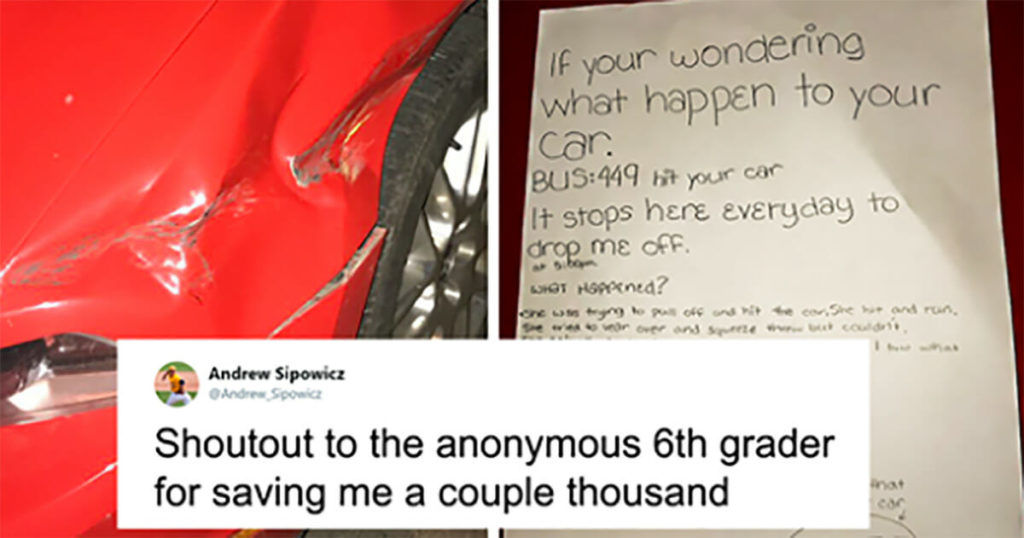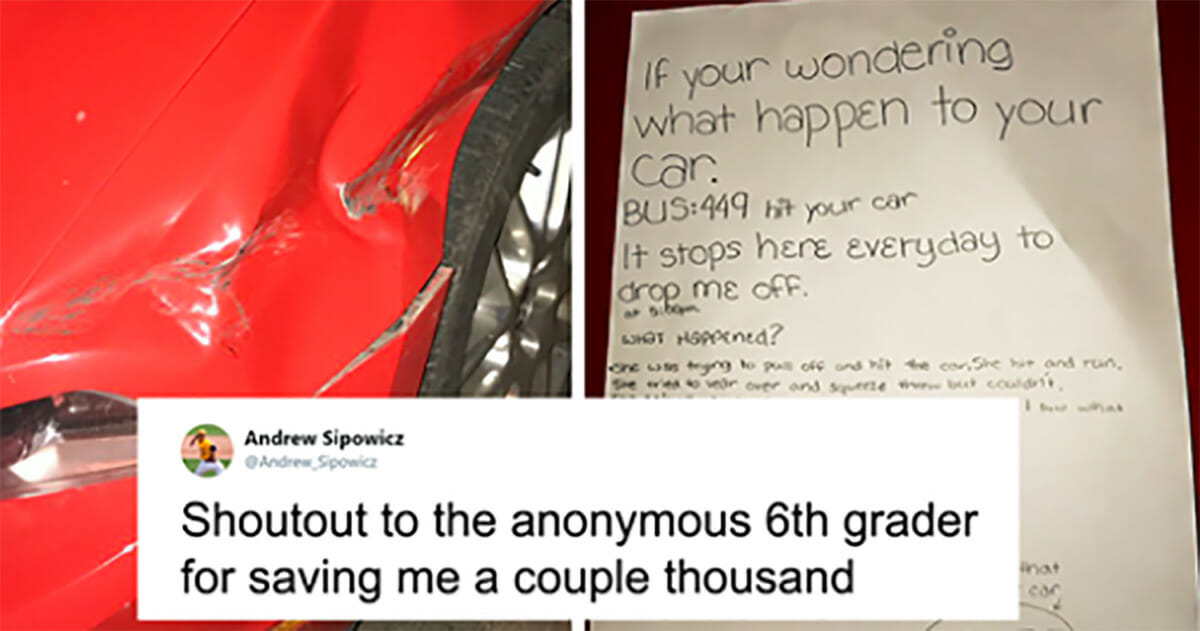This is a story of two kids: one who does the right thing and another who, well… you decide.

When a sixth-grade student at Houghton Academy near Buffalo, New York noticed that the bus driver had accidentally hit a parked car, then left the scene, this student jumped into action, leaving a note on the car of Canisius College student Andrew Sipowicz.
As reported by WIVB-TV, Buffalo (Nov. 21, 2018), “[The driver] was trying to pull off and hit the car,” the note said. “She hit and run, She tried to vear [sic] over and squeeze through but couldn’t. She made a dent and I saw what happened.”
“The note was signed: ‘A 6th grader at Houghten [sic] Academy.’ It even included an illustration of the bus.”
“Sipowicz,” WIVB reported, “took a picture of the note, and tweeted it out on Tuesday. Nearly 24 hours after the post was made, it already had more than 100,000 retweets and more than 500,000 likes.
“ ‘I’m extremely grateful for what she did,’ Sipowicz said. ‘It takes a lot of courage. It’s not easy to do, especially being that young. It’s easy to go home and go on with your day and act like nothing happened. But she thought she had to do the right thing and I’m really grateful she did.’ …
“Sipowicz, who is from Orchard Park,” WIVB-TV added, “hasn’t met or spoken to the sixth-grade student yet, but says a teacher at Houghton Academy reached out to him and said they were able to identify the student through an analysis of the handwriting on the note. He is hoping to thank the student in person.
“ ‘She deserves a reward for what she did,’ Sipowicz said.”
While the student has not been publicly identified, Sipowicz said he had been contacted by the vice principal of Houghton Academy and told that the school celebrated the student’s “outstanding leadership” and presented her with a citizenship award.
This next story appears simple, even cute due to the age of the child, but it demonstrates how easy it is to place self-interest ahead of what’s right.
In a YouTube video, a six-year-old boy is sitting at the kitchen table doing his math homework. Stumped by a problem, we can hear him ask for help, not from a parent or sibling, but his handy-dandy Amazon assistant.
“Alexa, what’s 5 minus 3?”
The voice-activated device quickly responds: 2.
All of this was caught in a video shot by his mother who watched from a nearby doorway.
“Booooy,” the mother said. At this point, the video stops.
However, more surprising to me was a response from a teacher.
“Clint Hill,” NPR reports (Jan. 10), “an English teacher at Patrick Henry High School in Roanoke, Va., says in his classrooms he often sees ‘kids quietly talking into their phones and asking Google or other services: Hey, how do you spell some complicated word that they don’t know.’
“But Hill, who co-hosts the education podcast… says he doesn’t mind. After all, he uses a little tech help on his grammar once in a while. ‘I struggle with spelling, and spellcheck on my word processing has been a life saver for me,’ he says.
“ ‘I think being able to use those technological aids is not hurting anybody. I think it’s just improving our ability to use our brains for other things,’ Hill adds.”
“I think it’s just improving our ability to use our brains for other things”!
How about using our brains for things like… basic homework, Clint?
I remember being in school when pocket calculators were first introduced. No teacher ever believed that using such “technological aids” was acceptable in either homework or tests.
The point behind homework is to use our brains to figure it out.
“ ‘One of the best gifts we can give our children is doing that kind of problem-solving together,’ says Diane Levin, a professor of applied human development at Boston University.
“Levin,” NPR continues, “is also the founder of the nonprofit Truce, or Teachers Resisting Unhealthy Children’s Entertainment. She says it’s crucial for children to learn to struggle — even just a little — with challenges.
“ ‘They will use those skills that they’re learning for all kinds of things that come along,’ Levin says. ‘If they are a good problem-solver they’ll do better than kids who just go to a screen to get the answer.’ ”
I hated doing math homework. Knew I would rarely use it in real life, but I had to live with the struggle doing the work, the same way I struggled with complex writing assignments.
The point is, eventually, I learned how to do basic math and English skills.
According to ABC-TV Chicago affiliate Channel 13, “The mom said she was surprised to catch her son cheating, especially since math is his favorite subject. In the future, she plans to turn off the device to prevent him from cheating again.”
Here’s another interesting example of how students rationalize unethical behavior.
Comments










